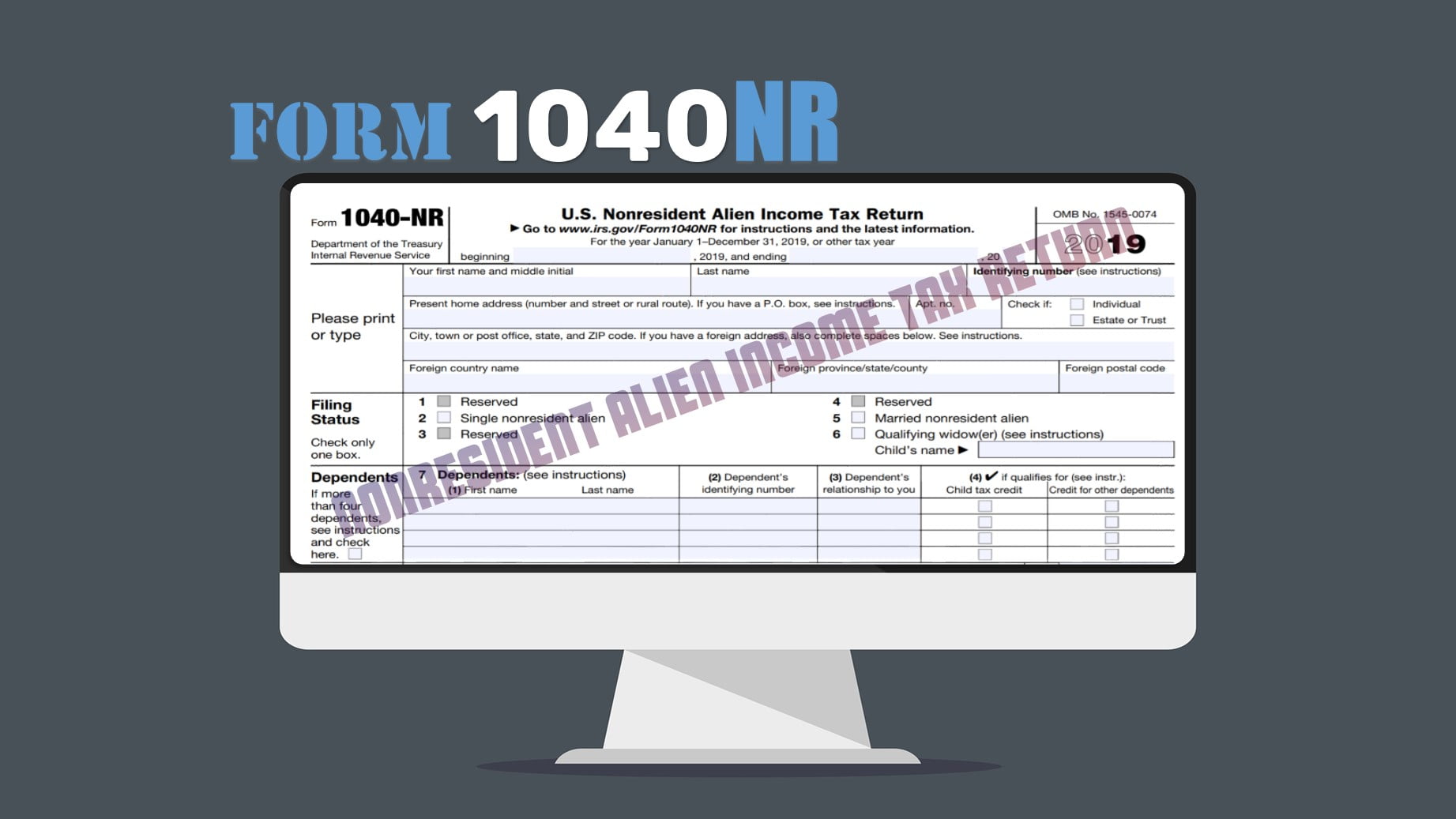
As one of the most complex tax situations that you could find yourself in, figuring out the way to report earnings as a non-resident alien of the United States can be extremely difficult. Those who fall under this status are people who are not citizens of the U.S. and have not established permanent residence yet. Anyone outside of those two classes, with certain exceptions, will have to file a so-called Form 1040NR. It is fairly similar to the regular form 1040 that other taxpayers have to file. The “NR” portion of it, which stands for “non-resident” alien, however, brings in some modifications.
Who Must File?
Merely being a non-resident alien does not immediately mean that the filing of Form 1040NR has been triggered. In order for the government to be eligible to take taxes from you, there have to be U.S.-based earnings involved. That means that only non-resident individuals who receive W-2 wages, 1099 independent contractor earnings, and other forms of income will have to pay U.S. tax.
To accurately determine if your status falls under this category, you must consider the substantial presence test. This is what guides people who do not have citizenship or permanent residency when it comes to their tax-filing status. The math is straightforward as you simply need to conclude if you spent 31 days or more in the U.S. in the current year and a total of 183 days during the current and two prior years. If the answer is yes, you will qualify for tax residency and you must file a regular Form 1040. If not, however, you have to take a careful look at Form 1040NR instructions before you start filling in the numbers.
Most Common Users of Non-Resident Alien Form
A very common group of people who have to file the Form 1040NR are international students attending high school or college education through study or exchange visas known as F-1 and J-1. Their situation is often the epitome of who the IRS meant to apply the law to. Occasionally, however, the situation tends to get a little tricky as most students spend multiple years pursuing their degrees. If they reach a point where they satisfy the substantial presence test, they are automatically granted tax residency and must file the regular Form 1040 for the year in which the test was passed.
Simplifying the Process
As with all other types of reporting, the IRS lets non-resident aliens report their earnings through a 1040NR EZ. Unlike the full-length form that spreads over five pages and contains more than a hundred lines, 1040NR EZ only has two pages and less than 30 number-based lines. Since the vast majority of the lines have been removed, you will only be allowed to file the shorter form if your income comes from the following sources:
- Wages and salaries;
- Tips;
- Tax refunds;
- Taxable scholarships;
- Fellowship grants.
If you also need to report things like passive income related to capital gain or loss, interest, real estate, and similar, you must utilize the longer form.
Obtaining an Identification Number
As a non-resident alien, you will only have a social security number if you already held a sponsored job and got a social security card based on an employer-provided letter of proof. Many individuals do not meet this requirement and have no social security number to connect to their tax return. This is where the Individual Taxpayer Identification Number (ITIN) comes in. The ITIN is available to most non-resident aliens as it is the only form of identity verification that they can rely on. To get the number, you have to file Form W-7, which is the IRS Application for Individual Taxpayer Identification Number, alongside proper paperwork proving that you are indeed a foreign national who is a non-resident alien. If you already have a social security number (SSN), remember that there is no need to file for an ITIN because the IRS will take the SSN instead.
Deadlines and Extensions
As per the Form 1040NR EZ instructions, which are just a shortened copy of the 1040NR instructions, your deadline for filing the return is June 15. This is two months past the normal deadline for all other taxpayers using Form 1040. It is important to note, however, that your deadline will also depend on the type of income that you received. If any of your earnings were subject to U.S. federal withholding, you will have to file by April 15 like all other citizens and resident aliens.
In case you find yourself unable to meet the mandated reporting due dates, the IRS will let you claim an extension by filing Form 4868. This does not mean that any tax liability will be postponed as the government still expects to receive payment before the deadline. So, you might have to do some math and figure out an approximate amount of taxes that are owed. You can then use the extension that will normally go until December 15 to fill out all the forms and submit any additional payments or refund requests. Failing to make a timely payment due to your inability to comprehend the tax filing process is going to result in hefty penalties. Hence why most non-resident aliens who are unsure about how to file correctly utilize professional accounting services.
Main Differences Between Regular and Non-Resident Forms
One of the most common questions that are not answered by the 1040NR EZ instructions or any other formal paperwork relates to the actual difference between the regular Form 1040 and the NR version. Obviously, one is made for citizens and residents while the other one only targets non-residents. But what exactly is the reason why there had to be differentiating forms for what seem to be essentially the same types of income?
The first reason is that the non-resident aliens did not qualify for the standard deduction back when it still existed prior to the 2017 tax law change. Also, the U.S. has innumerable tax treaties with countries from all over the world and those treaties cannot be reported or listed on a regular 1040. Finally, non-resident aliens are not subject to the same types of taxes as everyone else. For instance, they do not have to pay self-employment tax on self-employment income because they do not get to claim any social security benefits or medicare. Therefore, the easiest way to non-residents’ tax needs from everyone else’s was to simply provide them with a specialized form.
The information is not intended to constitute professional advice and may not be appropriate for a specific individual or fact situation. It is written by the author solely in their personal capacity and cannot be attributed to the accounting firm with which they are affiliated. It is not intended to constitute professional advice, and neither the author nor the firm with which the author is associated shall accept any liability in respect of any reliance on the information contained herein. Readers should always consult with their professional advisors in respect of their particular situations.
— Sami Ghaith
CPA, CGA, MBA


1 comment on “Everything You Need to Know About Form 1040NR”